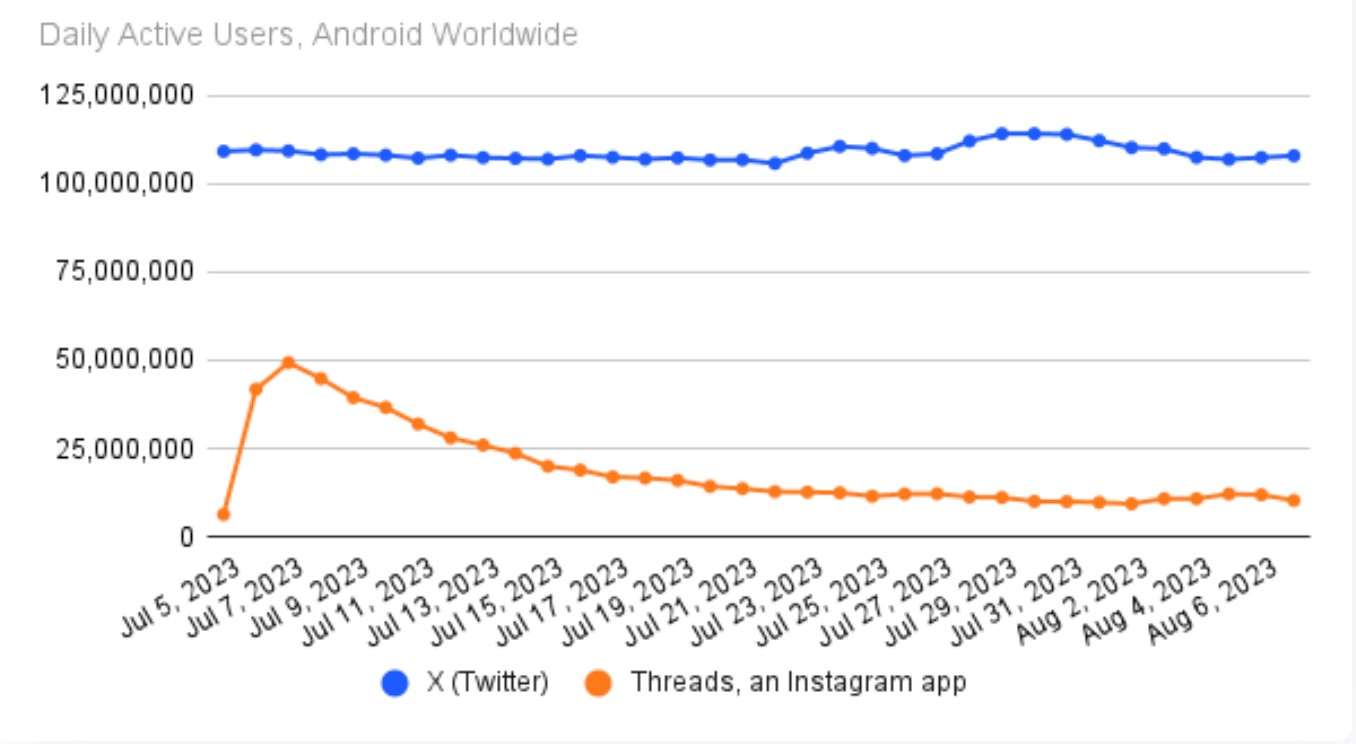Mark Zuckerberg may have put the brakes on a cage fight, (for now), but he’s showing no sign of backing away from a duel when it comes to pitching Meta’s Threads app vs Elon Musk’s X writes Brendan Almack and Michaela Simpson.
Threads made big news in July, when it amassed nearly 50 million daily active users in less than a week from over 100 countries, including the UK. To put this in context, according to SimilarWeb, X is recording just over 100 million daily active users.
Twitter and Threads
Even though its daily active users have fallen back to the region of 10 million in August, it’s a phenomenal start for Threads which has become the fastest growing app in history.
And with Threads for web bringing the platform to desktop last week and Threads search functionality coming soon according to Zuckerberg, this battle sounds far from over.
As EU citizens, we’ll have to watch from the sidelines for the time being, as we still do not have access to Threads here due to ‘upcoming regulatory uncertainty’ according to Meta.
That’s frustrating as Threads actually represents so much more than just a direct competitor to X. It’s a first glimpse into the future of the social web.
Threads: The first step towards a user centric social web?
The more frustrating aspect of EU regulations prohibiting the launch of Threads here is that, ironically, Threads could represent a complete shift away from the walled-gardens that these platforms have come to be known as.
Meta plans to make Threads compatible with the open source standard known as ActivityPub. This would make Threads interoperable and part of what is referred to as the open social web. In very basic terms this would mean that your username, followers and content can be used and viewed across multiple social platforms.
This unshackles users from a single platform and doesn’t penalise them for moving from one platform to another. It also means that people on different social platforms can see and interact with each other’s content. This is a massive step by Meta and could be a window into the future of social networking on the web. That’s why it’s ironic, that of all apps that EU citizens don’t have access to, it’s the one app that could represent a shift towards a user centric approach to social media platforms.
Zuckerberg may have been humbled by his failed Metaverse escapades or maybe he recognises the potential reach that content on an interoperable platform could have. Whatever his motivations, the biggest player in social getting behind an open source approach like this could lead to an explosion of innovation in the space where many platforms compete to attract, retain and monetise users knowing that those users could up and leave as soon as the experience doesn’t meet their expectations.

What does all this mean for businesses?
For brands and businesses, it reinforces the importance of first party data. Renting audiences from behemoth platforms may not be the future of the social web, so de-risking from an overreliance on any one platform by collecting, nurturing and extracting value from owned audience data is going to be critical for brands that want to interact with customers and potential customers. CRM solutions are going to explode in popularity. We’ve already seen this at Wolfgang as demand for our CRM and Marketing Automation offering has increased by >100% YoY. As Klaviyo’s Agency Partner, clients are already being featured as case studies on their website. You can read our latest lead gen case study published by Klaviyo here.
If the future of the social web is decentralized, brands need to take responsibility for their own customer data today.
Brendan Almack is managing director of Wolfgang Digital and Michaela Simpson it the agency’s head of content.






















